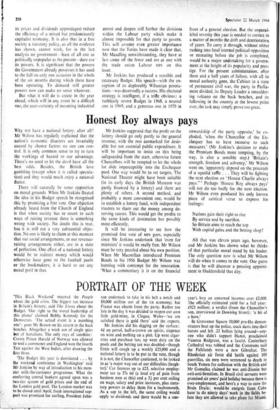Honest Roy always pays
Why not have a national lottery, after all? Mr Wilson has regularly explained that the nation's economic disasters are invariably caused by chance factors no one can con- trol. It is only common sense to try to turn the workings of hazard to our advantage. There's no need to let the devil have all the best odds. Besides, the British love gambling (except when it is called specula- tion) and they would much enjoy a national flutter.
There will naturally be some opposition on moral grounds. When Mr Jenkins floated the idea in his Budget speech he recognised this by promising a free vote. One objection already heard from the Church of England is that when society has to resort to such ways of raising revenue there is something wrong with society. No doubt this is true, but, it is still not a very substantial objec- tion. No one is likely to claim at this moment that our social arrangements, or our revenue- raising arrangements either, are in a state of perfection. One effect of a national lottery would be to redirect money which would otherwise have gone to the football pools or the bookmakers; it is hard to see any moral peril in that. Mr Jenkins suggested that the profit on the lottery should go only partly to the general revenue, with the rest earmarked for desir- able but not essential public expenditure. It will be important to insist on this being safeguarded from the start, otherwise future Chancellors will be tempted to let the whole lot slide imperceptibly into the Exchequer pool. One way would be to set targets. The National Theatre might have been suitable (in its early days the British Museum was partly financed by a lottery) and there are plenty of others. A second method, and probably a more convenient one, would be to establish a lottery fund, with independent trustees to share out the money among de- serving causes. This would get the profits to the same kinds of destination but possibly more efficiently.
It will be interesting to see how the promised free vote of MPS goes, especially since Mr Jenkins undertook that 'even for mioisters' it would be really free. Mr Wilson must be very puzzled about his own position. When Mr Macmillan introduced Premium Bonds in his 1956 Budget Mr Wilson was bursting with contempt for the innovation. 'What a commentary it is on the financial stewardship of the party -opposite,' he ex- ploded, 'when. the Chancellor of the Ex- chequer has to have recourse to such measures.' (Mr Jenkins's decision to make the Premium Bonds more tempting, by the way, is also a sensible step.) `Britain's strength, freedom and solvency,' Mr Wilson went on, `apparently depend on the proceeds of a squalid raffle . . . They will be fighting the next election on "Honest Charlie always pays."' Perhaps 'Honest Roy always pays' will not do too badly for the next election. Mr Wilson even produced his only known piece of satirical verse to express his feelings:
Nations gain their right to rise By service and by sacrifice.
So Britain aims to reach the top With capital gains and the betting shop!
All that was eleven years ago, however, and Mr Jenkins has shown what he thinks of that particular moral stand by his leader. The only question now is what Mr Wilson will do when it comes to the vote. Our guess is that he will discover a pressing appoint- ment in Huddersfield that day.






































 Previous page
Previous page